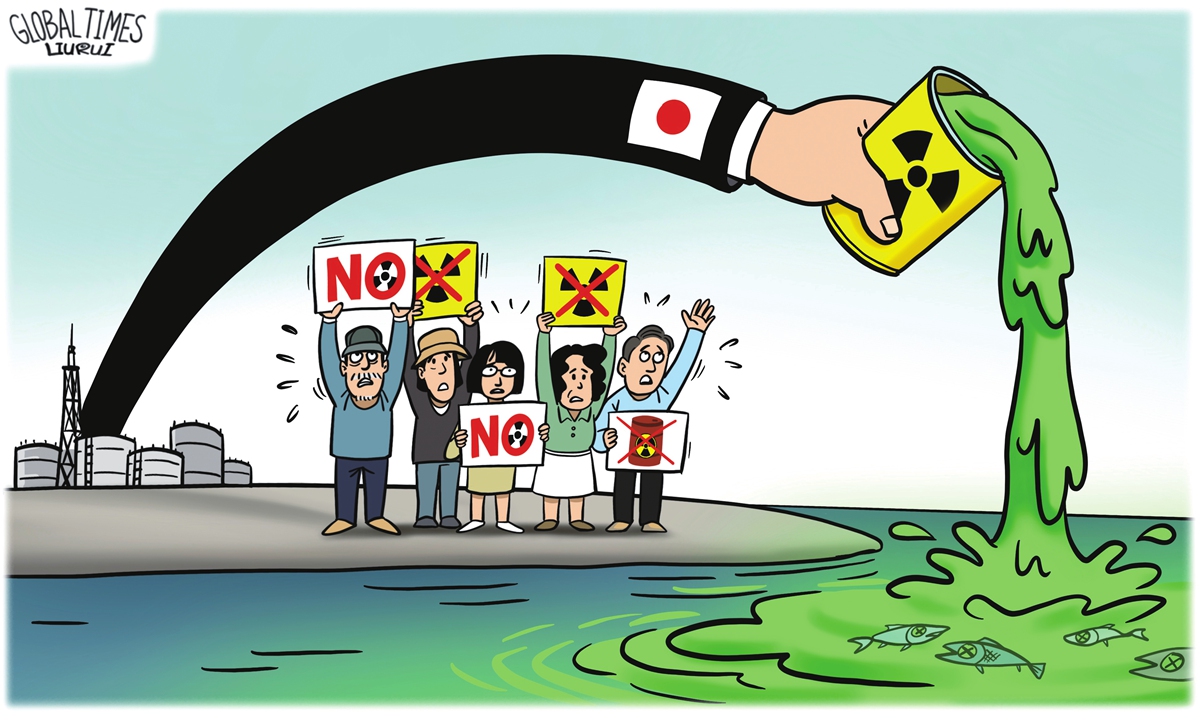
Japan's dangerous move.Illustration:Liu Rui/GT
The Japanese government and Tokyo Electric Power Company (TEPCO) have been unilaterally pushing forward with the plan to dump nuclear-contaminated wastewater from the Fukushima nuclear plant into the ocean, despite strong opposition from various parties, which has sparked intense backlash both domestically and internationally. According to Japanese media, the government led by Fumio Kishida plans to start releasing nuclear-contaminated wastewater into the ocean as early as August.
Since Japan is a signatory to the Rome Statute of the International Criminal Court and is bound by its legal obligations, I believe that the Japanese government's plan to dump the Fukushima nuclear-contaminated wastewater into the ocean meets the three requirements and five elements for constituting the crime of crimes against humanity, specifically "other inhumane acts" in the definition of crimes against humanity.
Crimes against humanity are acts of murder, extermination, enslavement, deportation or forcible transfer of population, among other inhumane acts, when committed as part of a widespread or systematic attack directed against any civilian population, with knowledge of the attack. With this type of crime being committed outside of any war, the word "civilian" can be understood as "people" while "attack" as "harm" or "damage."
The dumping of Fukushima nuclear-contaminated wastewater into the ocean essentially meets the general three requirements for constituting the crime of crimes against humanity.
First, crimes against humanity are clearly defined in the Statute and apply to Japan. Japan's Water Pollution Control Law, enacted in 1970, stipulates that the emission of harmful substances constitutes a crime and has long been regulated in Japan's domestic law and international treaties to which it is a party.
Second, the definition of crimes against humanity claims that with knowledge of the attack, the suspect intentionally carries out a widespread or systematic attack against civilians. Japan's public announcement and implementation of the plan to dump Fukushima nuclear-contaminated wastewater clearly exhibit the characteristics of "with knowledge of the attack" and "intentionally."
Third, the Japanese government has openly supported the dumping of nuclear-contaminated water into the sea and has launched a sustained diplomatic and publicity campaign, which demonstrates the organizational and systematic nature of its policy on ocean dumping and satisfies the requirement of a correlation between the policy and the act of dumping nuclear-contaminated wastewater into the sea. Moreover, Japan's decision to dump Fukushima nuclear-contaminated wastewater essentially meets the special five elements of "other inhumane acts."
In terms of the first element, the perpetrator inflicted great suffering or serious injury to the body or mental or physical health through an inhumane act. Japan's dumping decision will seriously harm the common interests of the international community and pose a substantial risk to the sustainable survival and development of humanity, which can be regarded as "serious harm."
The second element refers to the act "of a character similar to any other act referred to in article 7, paragraph 1, of the Statute." The nuclear-contaminated wastewater caused by a serious nuclear accident is completely different from the nuclear wastewater dumped during the normal operation of a nuclear power plant. Tokyo's dumping plan is a situation that seriously endangers or deprives living conditions, possibly resulting in "extermination, deportation or murder."
The third to fifth elements can be analyzed together, i.e. "the perpetrator was aware of the factual circumstances that established the character of the act," "the conduct was committed as part of a widespread or systematic attack directed against a civilian population," and "the perpetrator knew that the conduct was part of or intended the conduct to be part of a widespread or systematic attack directed against a civilian population."
Japan's detailed plan for the dumping of nuclear-contaminated water into the sea and its announcement to the whole world is a good indication that they are aware of the real situation that determines the nature of the dumping. Besides, the damage or harm caused by the dumping may not be immediately apparent. However, dumping is a long-term act that involves a wide range of targets and had irreversible consequences. In addition, the Japanese government provides public and systematic support to TEPCO's plan.
In conclusion, the dumping of Fukushima nuclear-contaminated wastewater into the ocean may be considered a crime against humanity. Several key Japanese politicians and other decision-makers and experts involved in endorsing this dumping may be subject to individual criminal responsibility for their official acts. They may also be subject to lifelong prosecution by the International Criminal Court. For the sake of sustainable survival and development of humanity, Japanese decision-makers and endorsers of this dumping should act with caution.
The author is a professor at the Law School of Zhongnan University of Economics and Law. opinion@globaltimes.com.cn




